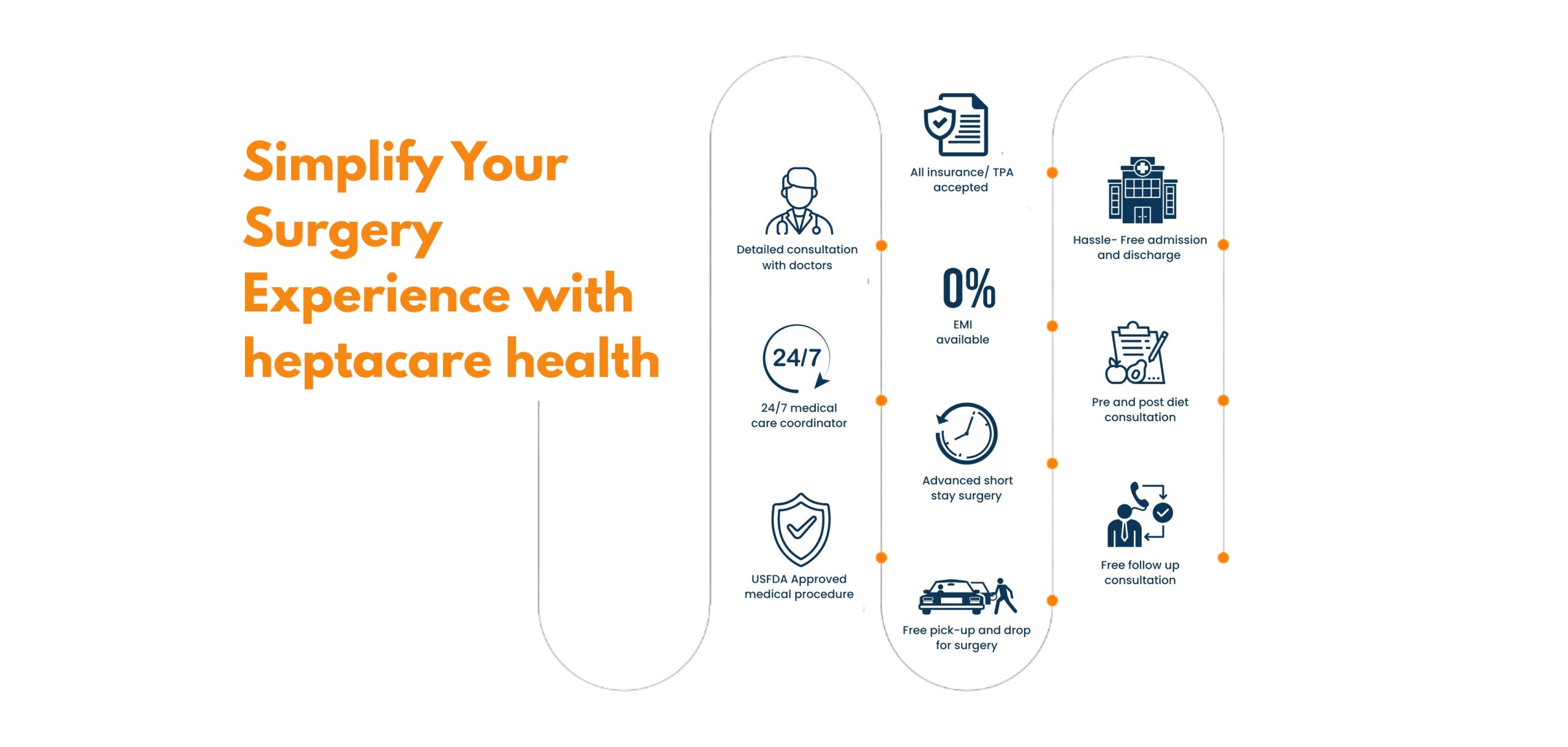A sebaceous cyst is a small, noncancerous lump beneath the skin caused by blocked sebaceous glands, often filled with oily or keratin material.
Do you need more facial hair? Having a full and heavy beard is a wish for many people. At HeptaCare Health, we provide beard transplants at affordable prices to help you get the beard that you’ve always wanted.
Happy Patients
Disease
Hospitals
Cities
A beard transplant is a very common procedure which involves enhancing the growth of facial hair or constructing a new beard by transplanting scalp hair. The treatment begins by understanding the facial dimension, and then the surgeon harvests the hair follicles from the back of the scalp. Those harvested hair follicles are implanted in the face through tiny incisions to create a new beard.
The most common technique for beard transplant is FUE (Follicular Unit Extraction). In some cases, FUT (Follicular Unit Transplant) is also used.
HeptaCare Health provides advanced beard transplant treatment at the best price across all cities of India. We leverage the FUT and FUE techniques to implant healthy hair follicles on the face where the person desires to grow a beard. Our highly experienced hair surgeons are skilled in performing all types of beard transplant surgeries to help patients in the best possible way.
Across the country, we have multiple clinics and partnered hospitals. All of our treatment centers are equipped with state-of-the-art facilities and have modern infrastructure. Our medical and non-medical professionals are well-trained to provide best-in-class care to the patients. If you are someone who wishes to get a beard transplant today, get in touch with HeptaCare Health and book your free consultation with our experts.
The process of hair transplant includes the following steps-
Irrespective of your choice of method, the first step will be harvesting the hair that will be transplanted. The head will be shaved to get a clear view of the scalp. A local anesthetic will be administered to ensure that the patient doesn’t feel any kind of pain or discomfort during the extraction of the strip or hair follicles.
After the follicles are transplanted, they are cleaned by a technician before implantation. Local anesthesia is then injected into the area where the hair follicles need to be transplanted. The surgeon will implant each follicle into the targeted area in the proper shape of a beard.
A person is considered a good candidate for beard transplantation as long as he has healthy hair on the scalp. People with male pattern baldness often request to get a beard transplant but can’t do so because of the limited hair on the scalp.
During the initial consultation, the surgeon always ensures that the patient has realistic expectations from the procedure. Another factor that is considered crucial is the patient’s medical and mental health. If the patient has some disorder, such as an autoimmune disease or impaired healing, he may be ineligible for the procedure.
If so, the doctor will suggest alternative treatment methods.
The preparation for beard transplant surgery starts weeks before the procedure is scheduled to take place. The patient is given the following instructions-
On the day of surgery, the patient is asked to avoid drinking coffee and other caffeinated beverages as they can cause jitters during the procedure. If there is any other precaution that needs to be taken before the treatment, the doctor or his/her team will instruct the patient accordingly.
Patients who undergo beard transplants may experience the following side effects-
Most of these side effects are temporary and often resolve on their own after some time. Even the scars become unnoticeable after the beard hair starts to grow. And the scarring on the scalp also gets covered with hair growth.
Immediately after the beard transplant, you can expect mild discomfort or tenderness in the face and scalp.
In the next few days, this will resolve as the donor and recipient area heals. When the skin heals, scabs will also start to form around the follicles, which is natural. The scabs will automatically fall off in the next few days.
The transplanted beard hair may also shed in two weeks. Don’t get alarmed, as the shedding doesn’t impact the long-term growth of beard hair.
The overall recovery period after a beard transplant is around 2-6 weeks which varies for each patient. From the day of surgery, till you get the desired results, you will have to take care of several things.
The results of a beard transplant can take around 2 to 6 months to appear. During this period, it’s crucial to be patient and follow the doctor’s instructions strictly. Within a year, the final results will appear, and the patient will have a denser and full-grown beard which looks completely natural.
Getting a beard transplant provides the following benefits to patients-
Some patients are willing to try alternative methods to beard transplant to see if they can grow facial hair. These alternatives will include the following-
It is a commonly used medication for hair loss which can also be effective at stimulating hair growth on the face. Topical minoxidil is available in liquid and foam varieties. The medicine can be taken orally or applied directly on the face to promote hair growth.
Though this medicine is quite effective, it may not work in every case.
There are numerous supplements available in the market that contains B vitamin biotin to promote hair growth. These supplements can be used to boost beard hair growth.
Another supplement that can be used is L-carnitine-L-tartrate. However, make sure that you take them after consulting a hair specialist.
It is true that hair growth is primarily determined by genetics, but lifestyle habits can have a huge impact on the same. There are many things a person can do to accelerate beard and scalp hair growth. Such things include-


Based on 7721 Recommendations | Rated 4.68 Out of 5
Happy Patients
Clinics
Cities
Surgeries
Doctors
Hospitals

A beard transplant is a cosmetic procedure that restores or enhances facial hair by transplanting hair follicles from the scalp to the beard area.

Vaginoplasty is a surgical procedure that tightens or reconstructs the vaginal canal to improve function, appearance, or both.

Treat anal fistula with safe, advanced procedures.
Minimally invasive care with faster recovery.

A breast lump is a swelling or mass in the breast that can be benign (non-cancerous) or, in some cases, a sign of breast cancer.

A tummy tuck, or abdominoplasty, is a cosmetic surgery that removes excess fat and skin from the abdomen and tightens the muscles for a flatter, firmer tummy.

A double chin is a layer of excess fat beneath the chin, often caused by weight gain, ageing, or genetics, and can be reduced through cosmetic treatments or lifestyle changes.

A sebaceous cyst is a small, noncancerous lump beneath the skin caused by blocked sebaceous glands, often filled with oily or keratin material.

A lipoma is a soft, benign lump made up of fatty tissue that grows slowly under the skin and is usually painless and harmless.

Liposuction is a cosmetic surgery that removes excess fat deposits from specific body areas to improve body shape and contour.

Lipomas are soft, moveable, and grow slowly; imaging may confirm.
No, lipomas usually remain or grow slowly over time.
They can be removed by surgery, liposuction, or sometimes steroid injections.
Yes, some people inherit a tendency to develop multiple lipomas.
● lipoma laser surgery cost in Vizag ● low-cost lipoma surgery in Hyderabad ● cashless lipoma treatment near me ● painless lipoma surgery in Vijayawada ● lipoma treatment with insurance in Vizag ● lipoma removal surgery cost in Hyderabad ● lipoma operation packages in Vijayawada ● affordable lipoma treatment near me ● lipoma laser treatment clinic in Hyderabad ● lipoma doctor consultation charges in Vizag ● best lipoma surgery cost in Vijayawada ● lipoma treatment hospital near me ● lipoma laser operation price in Hyderabad ● low-cost lipoma laser treatment in Vizag ● lipoma removal cost near me ● lipoma treatment with EMI in Vijayawada ● lipoma surgery specialist near me ● lipoma surgery packages in Hyderabad ● lipoma treatment clinic near me ● lipoma laser surgery near me
Disclaimer: **The result and experience may vary from patient to patient.. ***By submitting the form or calling, you agree to receive important updates and marketing communications.
Getting an accurate diagnosis can be one of the most impactful experiences that you can have.

cure with care
Copyright © 2025. All rights reserved.
Consult with our expert surgeon for more than 50+ diseases
Happy Patients
Hospitals
Cities